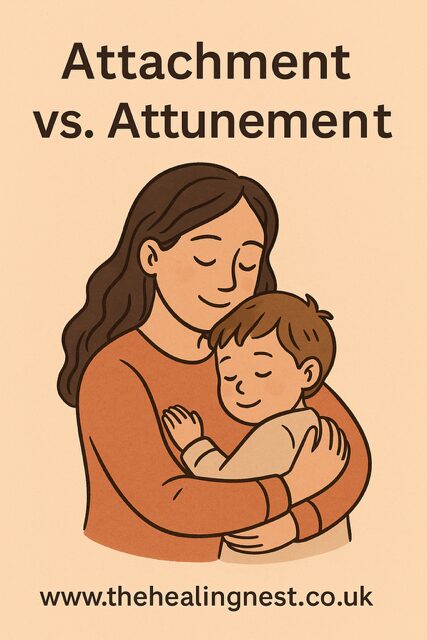When it comes to healing, growing, or simply understanding ourselves and our relationships better, two words often come up in therapy: attachment and attunement. They sound similar—and they’re deeply connected—but they’re not the same. Knowing the difference can give you insight into why some relationships feel safe and fulfilling, while others might feel confusing, distant, or overwhelming.
What Is Attachment?
Attachment is the emotional bond we form with the people we rely on—especially in early life. It begins in infancy, through the connection we have with our caregivers, and it shapes how we experience closeness, trust, and safety with others.
There are different attachment styles — secure, anxious, avoidant, or disorganised—and they tend to follow us into adulthood, influencing how we connect in romantic relationships, friendships, and even at work.
When our attachment needs are met consistently—when someone shows up, soothes us, and protects us—we tend to develop a secure attachment style. We learn that relationships are a safe place to turn to in times of stress.
What Is Attunement?
Attunement is a little different. It’s not about the bond itself, but the process of building that bond. Attunement is about emotional resonance—tuning in to what someone is feeling, even if they can’t express it clearly, and responding in a way that feels understanding and comforting.
Think of attunement like an emotional mirror: “I see you, I feel you, I get what you’re going through—even if I don’t have all the answers.”
You don’t have to be perfect at it. In fact, no one is attuned 100% of the time. But when someone is generally emotionally present and responsive, we feel seen, heard, and safe.
Why the Difference Matters
It’s easy to think that if someone loves us, they’ll always get us. But emotional connection isn’t just about being close—it’s about being in tune. You can have attachment without attunement—especially in relationships where physical or practical needs are met, but emotional needs are missed.
That’s why some people grow up in homes where their parents “did everything for them” but still struggle to feel truly known or understood. Without attunement, attachment may feel insecure or incomplete.
The good news? Attunement is a skill—and it can be learned and practiced at any age. Whether you’re a parent, a partner, or just trying to connect more deeply with others (or with yourself), learning to attune is one of the most powerful tools you can have.
In Therapy, We Practice Both
As a therapist, part of my role is to offer a safe, consistent space—a secure base—which taps into the healing power of attachment. But just as important is attunement: being fully present with your emotional experience, reflecting it back without judgment, and helping you understand your patterns with more compassion.
When we experience both attachment and attunement, we begin to trust—not just others, but ourselves.
Final Thoughts
Whether you’re exploring your childhood, working through relationship challenges, or trying to parent more intentionally, understanding the dance between attachment and attunement can be transformative. It’s not about being perfect—it’s about being present.
If this resonates with you, and you’d like support in exploring your own attachment patterns or learning the art of attunement, I’d be honoured to walk that path with you.
Reach out today to schedule a consultation—your path to deeper connection and healing starts here.
Andrea, x
📞 07957 784497
📧 andrea@thehealingnest.co.uk
🌐 https://thehealingnest.co.uk

